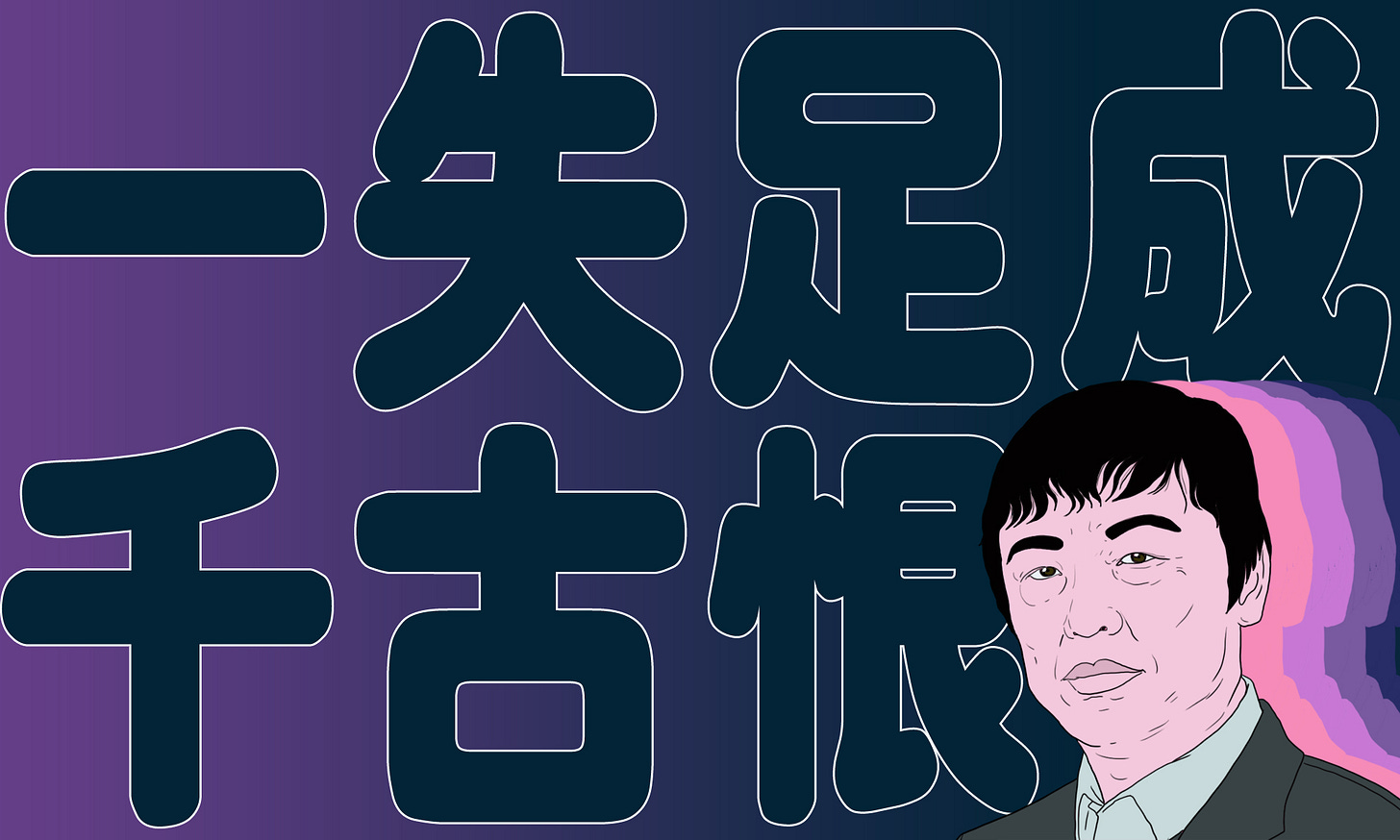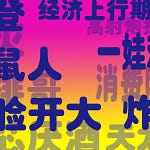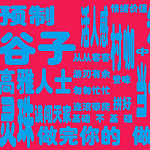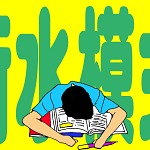Welcome to RealTime Mandarin—a multimedia resource to immerse you in the latest Chinese language trends, inspire you to practice and improve your Mandarin every week, and empower you to communicate with confidence.
Subscribe now to get the next issue straight to your inbox!
One of China’s most vocal online nationalists has seemingly been suspended from posting on social media platforms.
He is a media personality and a favourite of this newsletter: Hú Xījìn 胡锡进, the former editor-in-chief of the Global Times 环球时报.
Since his retirement from state media, Hu has continued to produce and post pro-government content prolifically on social media, including his WeChat public account (胡锡进观察), Weibo, and Douyin, as well as on Twitter/X.
But since July 27, Hu’s social channels have gone silent.
His last post on Weibo was demanding a full investigation into the hiring of an intern at CSC Financial (中信建投), a Chinese investment bank and brokerage firm.
The intern caused controversy when he posted a “day in the life of an intern” short video on social media. His account of a typical day involved him driving a Porsche to work and playing golf in the afternoon. He also carelessly leaked confidential information about three IPOs the firm was working on. The intern, a first-year university student, was rumoured to be the son of a senior retired political figure.
Some people think Hu’s sudden silence is because he has upset the wrong person in his reaction to this scandal.
Another interpretation of why Hu has stopped publishing on social media is because of an earlier article on his WeChat channel from 22 July, about the outcome of the recently concluded Third Plenum meetings in Beijing.
In this now-deleted article, Hu makes a claim about a subtle change in the wording of the communiqué published after the political meetings.
In the article, The Removal of this Key Phrase is a Historic Change (取消这一关键表述,是历史性变化), Hu suggests there may be good news for the private sector::
During the Third Plenum, the phrase "public ownership as the mainstay" was removed from the Decision, signalling that the non-public sector of the economy has achieved true equality with the public sector.
三中全会在《决定》中取消“公有制为主体”的表述,昭示着非公有制经济与公有制经济实现了真正的平等。
According to Chris Buckley of the New York Times, it’s Hu’s interpretation of the dropping of the term, “mainstay” (主体), and that it signals the private sector may become more important and “equal” to the state-owned sector, which may have got him in trouble.
Hu is no stranger to complaints or controversy.
He is described by pre-eminent Sociologist, Geremie R. Barmé, as a "voluble sophist", someone who reasons with the clever but with mistaken or false arguments.
In China his critics see him as an opportunist who eagerly takes a positive spin on whatever facts the government throws him, even if that means changing his position on what he's said before.
Hu has many nicknames because of this:
“Frisbee Hu” (飞盘胡) - often walking back on what he has said previously, like how a frisbee can come back to the thrower
"Frisbee-catching-dog Hu (叼盘胡) - likening him to a dog that collects the frisbee for his master (in Hu’s case, his master being the Chinese Community Party)
“Wall-rider Hu” (骑墙胡) - he sits on the fence trying to appease both sides of an argument; also known as “grass on the wall” (墙头草)
“Backwards Hu” (胡锡退) - a play on the last character in Hu’s name which means “forwards” (进), the opposite being, “to go backwards” (退).
As his nicknames suggest, Hu is adept at upsetting people across China’s political spectrum, from ultra conservatives to liberals.
But up to now, Hu has largely been allowed to publish content freely, sometimes publishing several posts per day.
So this makes Hu’s recent and sudden disappearance from public view all the more unusual.
In misinterpreting government statements on the economy at a time when discussions about the economy are so fraught in China, Hu Xijin may have finally crossed a line.
One thing most people agree on is that in China’s increasingly restricted media environment, this was inevitable:
Hu doing what he does, he is bound to get hurt.
Just like when you walk by the river, you're bound to get your feet wet.
If you often travel at night, you're bound to encounter a ghost eventually.
人在江湖飘,哪能不挨刀?常在河边走,难能不湿鞋?夜路走多了,总有遇到鬼的时候。[3]
So, will Frisbee Hu be back?
What do you think?
That's what we explore this week!
Favourite Five
1. 骑墙派 qí qiáng pài
wall-rider; fence-sitter
网友觉得老胡是个骑墙派 - Chinese netizens think Hu is a fence-sitter. [4]
Related:
叼飞盘 diāo fēi pán - throwing and catching a frisbee
墙头草 qiáng tóu cǎo - grass on the wall that goes to whatever direction the wind blows
执两端而取中庸 zhí liǎng duān ér qǔ zhōng yōng - cover the middle ground
2. 指点江山 zhǐ diǎn jiāng shān
to give directions to matters of national importance
胡锡进是官媒《环球时报》前总编辑,正厅级老总,在位时指点江山 - Hu Xijin is the former editor-in-chief of the state media Global Times, a high-ranking official who weighed in on events of national importance during his tenure. [3]
More: An idiom attributed to Mao Zedong. Used sarcastically here.
3. 满盘皆输 mǎn pán jiē shū
to lose everything, a complete defeat
一着不慎,满盘皆输,老胡,竟然也被“停更”了 - One wrong move, and everything is lost; even Lao Hu has been "suspended from posting". [3]
4. 一失足成千古恨 yì shī zú chéng qiān gǔ hèn
one misstep brings eternal regret
这真是,一失足成千古恨,再回首是万年人 - This truly is a case of a single misstep leads to a lifetime of regret; when one looks back, a thousand years have passed. [3]
More: Learn more in tomorrow's Sinica Phrase of the Week.
5. 常在河边走,难能不湿鞋 cháng zài hé biān zǒu, nán néng bù shī xié
if you walk by the river often, it’s hard to avoid getting your shoes wet
人在江湖飘,哪能不挨刀?常在河边走,难能不湿鞋?夜路走多了,总有遇到鬼的时候 - Hu doing what he does, he is bound to get hurt. Just like when you walk by the river, you're bound to get your feet wet. If you often travel at night, you're bound to encounter a ghost eventually. [3]
Consuming the Conversation
Useful words
6. 没准 méi zhǔn
maybe, perhaps
事过境迁之后,没准还能得到更好的补偿 - He might even get better compensation when the matter is settled. [1]
Note: Indicates surprise, and what comes after is usually positive.
7. 进盐 jìn yán
to be silenced, to be banned from posting
老胡被“进盐”,其实对他来说是好事 - Old Hu being silenced is actually a good thing for him. [1]
Note: An ad hoc slang for "censored" or "banned" as it sounds the same as 禁言 jìn yán. This is probably to avoid censors.
8. 停更 tíng gēng
to stop posting
有谁能想到有朝一日,他自己竟然也被“停更”呢? - Who would have thought that one day, he himself would also be suspended from posting? [3]
Related:
封笔 fēng bǐ - to retire from writing
禁言 jìn yán - to be silenced, or censored
封号 fēng hào - account suspended
9. 姑且 gū qiě
for the time being, tentatively
咱们也姑且称之为“老胡”吧 - For the time being, let’s call him"Old Hu". [3]
10. 找骂 zhǎo mà
to seek criticism, to provoke criticism
这也是老胡“找骂”体质的根本原因 - This is also the fundamental reason for Old Hu's ability to attract criticism. [4]
Related:
骂娘 mà niáng - curse, cursing
挨骂 āi mà - be criticised
11. 横跳 héng tiào
lateral jump, switch back and forth
这段话不多,老胡能在四个观点间“横跳” - This passage is short, but Old Hu can switch back and forth among the four viewpoints. [4]
Related:
反复很挑 fǎn fù héng tiào - continually jumping from one position to the next (an internet slang originally from Japanese, Zoe discusses more in the Member Podcast).
Three-character phrases
12. 和稀泥 huò xī ní
smooth things over, avoid taking a stance
老胡一反和稀泥的常态,要求一查到底 - This time, Old Hu didn’t smooth things over. Instead, he demanded a full investigation. [1]
13. 搅混水 jiǎo hún shuǐ
stir up trouble, muddy the waters















